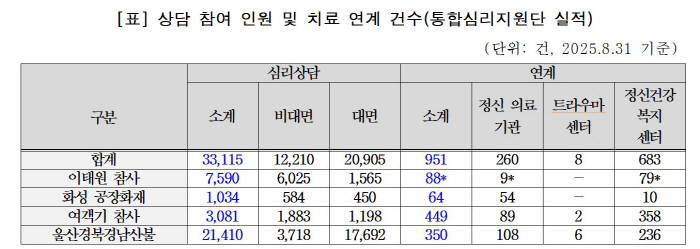Mental health problems such as PTSD, disaster response personnel such as fire and police...Urgent long-term support system
Oct 29, 2025
|
According to the data submitted by Seo Young-seok (Democratic Party of Korea) of the National Assembly's Health and Welfare Committee from the Ministry of Health and Welfare, only 951 (2.9%) of the 33,000 consultations of the National Trauma Center Integrated Psychological Support Group over the past four years were linked to actual treatment and management.
In the case of the Itaewon disaster, only 88 cases (1.2%) out of 7,590 consultations, 64 out of 1,034 cases (6.2%) in Hwaseong factory fires, 449 (14.6%) out of 3,081 cases, and only 350 (1.6%) out of 21,410 wildfires in Ulsan, Gyeongbuk, and Gyeongnam led to treatment and management.
In particular, psychological support for disaster response personnel such as police and firefighters was even more insufficient. In the case of the Itaewon disaster, 203 initial consultations were made for response personnel, accounting for only 2.7% of the total, and in the case of the airplane disaster, only 47 out of 311 (15.1%) were linked to treatment.
In addition, according to the data submitted by the National Fire Agency to Representative Seo, the PTSD risk group increased from 5.6 percent to 7.2 percent over the past six years (2019-2024), the depression risk group increased from 4.6 percent to 6.5 percent, and the suicide risk group increased from 4.9 percent to 5.2 percent, showing a clear trend in overall mental health deterioration.
In response, Representative Seo Young-seok proposed a partial amendment to the Act on the Promotion of Mental Health and Support for Welfare Services for Mental Illness (Mental Health Welfare Act), which stipulates systematic and long-term psychological support for disaster response personnel as the state's responsibility.
The revised bill mandates ▲ the state and local governments to come up with measures to support psychological stability and social adaptation of disaster response personnel (new Article 4 (7)), ▲ the National Trauma Center will be in charge of investigating the mental health status of disaster response personnel and supporting treatment and rehabilitation (new Article 10 (1) 8), and ▲ stipulates the basis for the development of psychological support programs including psychological treatment and rehabilitation.
Representative Seo emphasized that "It is true welfare that is responsible for the recovery of the psychology of disaster victims" and that "systematic psychological support for field officials exposed to repeated trauma is still insufficient, especially as both the counseling participation rate and the connection rate of disaster response personnel are low." "We need to establish a long-term psychological support system that encompasses not only disaster response personnel but also victims as a whole to establish a sustainable and stable foundation for state support." he said.
This article was translated by Naver AI translator.














